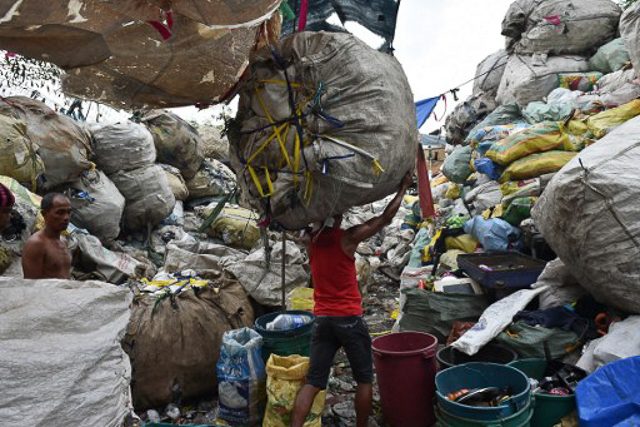SUMMARY
This is AI generated summarization, which may have errors. For context, always refer to the full article.

MANILA, Philippines – They are the vendors selling your favorite street food. They are the jeepney drivers plying highways for over 12 hours to earn decently. They are just some of the workers in the so-called informal economy.
May marks the Department of Labor and Employment’s month-long celebration for the labor sector, a chunk of which is composed of those working in the informal sector – among the most vulnerable members of the Filipino labor force.
The International Labor Organization (ILO) defines informal economy workers as those “independent, self-employed, small-scale producers and distributors of goods and services.”
Aside from ambulant vendors and jeepney drivers, these labor sector also includes domestic helpers, tricycle drivers, and unpaid family workers.
Latest Labor Force Survey figures put the number of informal sector workers at 15.6 million or 38% of the total working population of the country.
A policy brief by the Philippine Commission on Women (PCW) regarding the proposed Magna Carta for Informal Sector Workers said that the informal economy plays a crucial role in income generation in a country like the Philippines with high unemployment rate and poverty incidence. (READ: On the job: The Filipino precariat)
“Persons who would otherwise be unemployed or without livelihood take refuge in the informal economy especially in developing countries that have a large and rapidly growing labor force,” said the PCW policy brief.
“This is due to the ‘relative ease of entry and low requirements for education, skills, technology and capital” in most economic units and activities in the informal economy’,” it added.
Social protection
Because of their informal livelihood, workers in this sector are not covered by labor laws and standards, making them highly vulnerable.
Among the manifestations of this vulnerability is the lack of access to social protection.
Since most workers have low productivity, their income is also not enough to pay for the premiums of social safety net providers such as the Social Security System (SSS) and the Philippine Health Corporation. (READ: ‘Filipinos are working hard but remain poor’ – World Bank)
Under its current set up, the SSS requires employers to pay around 70% of their employee’s monthly contribution while the 30% balance is the responsibility of the employee.
Informal sector workers, however, must pay the full monthly dues since they have no direct employers and are enrolled as voluntary members, giving them the chance to skip payments.
Certain government policies have worked on encouraging pension payments from the informal economy members.
SSS launched in 2012 its AlkanSSSya Program, which allows low-income earners to pay the minimum P300 monthly contribution by saving P11 per day in a steel coin bank. There’s also Republc Act 10361 or the “Kasambahay Act”, which requires employers to pay the monthly contribution of their domestic helpers.
As of November 2016, voluntary SSS members numbered 3.8 million, while self-employed members totalled 4.5 million. These comprise around a quarter of the total 34.78 million membership of the SSS.
Despite these efforts, collections among these members remain low. In a year, the total expected contributions should be P30.1 billion, but SSS reported that in 2016, they were able to collect only P13.11 million from the informal sector workers.
A 2016 study by the Philippine Institute for Development Studies also said that 40% who are not dependents and are not employed in the formal economy have no health insurance. (READ: P20,000 livelihood grant available for vulnerable workers)
Various Congresses have proposed a Magna Carta for Workers in the Informal Sectors, which seeks equal rights for workers in the formal and informal economies by giving affodable social protection and security in the workplace, among others.
No law has been passed to date but in the 17th Congress, 4 measures pushing for it remain pending in the Senate, while 5 similar bills have been filed in the House of Representatives.
Passing this law would help fulfill the Philippines’ international obligations: the International Convention on Economic, Social and Cultural Rights, which pushes for the right of everyone to social insurance and Sustainable Development Goal number 8 or the “promotion of inclusive and sustainable economic growth, employment and decent work for all.” – Rappler.com
Add a comment
How does this make you feel?
There are no comments yet. Add your comment to start the conversation.